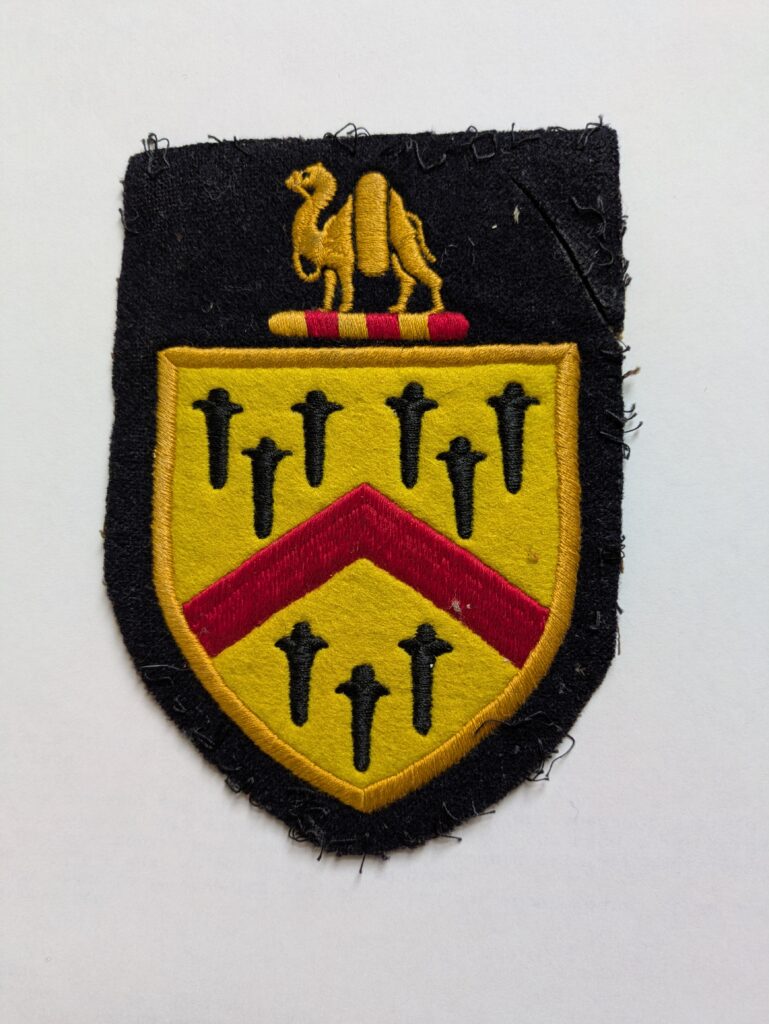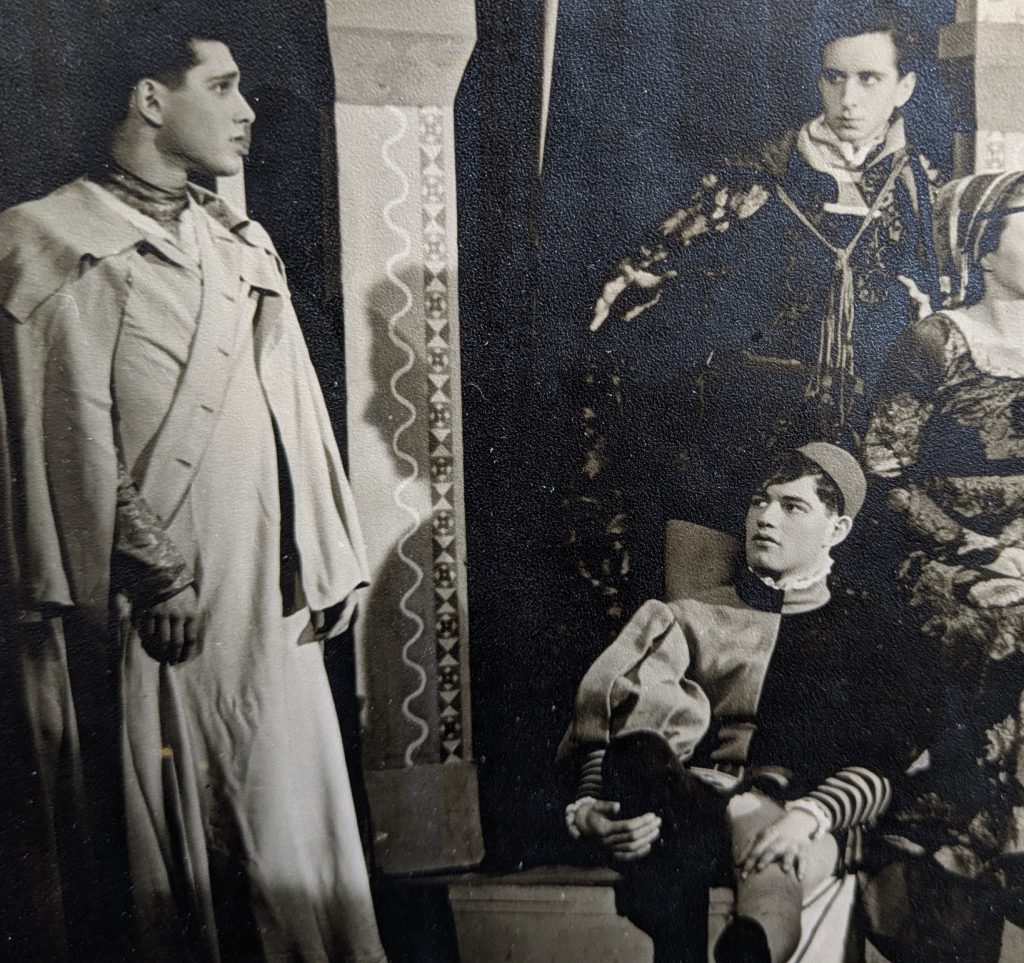From The Pinter Review, Collected Essays 1999 and 2000, edited by Francis Gillen and Steven H. Gale (The University of Tampa Press, Tampa, Florida, 2000)
PINTER AT SCHOOL by Henry Grinberg
I first got to know Harold Pinter in 1947 when he and I were at school together in London during the bleak austerity days right after the Second World War. I was seventeen at the time; he was some months younger. We were Sixth Formers together at the Hackney Downs School, in its two-year university prep division. I was in the Upper Sixth, and he was in the Lower. Hackney Downs School, formerly known as The Grocers’ Company School, had a distinguished tradition. It was among those private, so-called grammar schools founded by trade guilds to serve their members—some dating from medieval times, some remaining in operation today. Others of this kind in England included The Merchant Tailors’ and The Skinners’ School for Girls. If you couldn’t afford the fees, entrance was by competitive examination. The symbol of Grocers’ and of Hackney Downs was a shield bearing cloves because, originally, the grocers were the spice merchants. It was a pukka sort of school, where, if you stayed after Matric to enter the Sixth Form, you were supposed at sixteen to have decided on your future life, and you were expected to specialize in one of three programs: the arts, the sciences, or economics. Pinter and I were members of the Sixth Arts.

We English schoolboys never referred to each other by our Christian names, which was a laugh by itself, since a lot of us at Hackney Downs were Jewish and working class, not members of what you might consider your typical lah-di-dah prep school. By that time in its history, the school was being run by the London County Council, no longer by the Grocers’ Guild. And, even though it was divided into houses with housemasters, prefects, monitors, school colors, and all the studied rituals and excitements of inter-House rivalry in sports and scholarship: all the boys came from North and East London. We didn’t live in the charming English countryside or reside in dormitories like boys at Eton, Harrow, Rugby, or Winchester, but walked or traveled back and forth on London Transport—trolley-bus or Tube. We went home to our moms and dads, not to the maters and paters such as you might find at spiffier schools.
I first became aware of Pinter when he was chosen to play Macbeth at Hackney Downs in spring 1947 in one of the school’s annual productions, revived after the war by Joseph Brearley, one of the senior masters and an exciting and vital teacher. Pinter burst into view as quite an accomplished schoolboy actor at sixteen. He delivered Macbeth’s anguished, embittered lines with conviction, I thought, and convincingly painted his transformation from hero to monster.
The following academic year, 1947-48, Pinter moved up into the Sixth Arts, and we shared a front-row desk for that year. The Sixth Arts met in the Tower, a wonderfully secluded room on the top floor of the school’s massive, sprawling Victorian brick building, just under the belfry, with its own private staircase. You could get up to almost any larks you pleased in that seclusion. But, in the main, we were a pretty serious, if not high-minded, bunch in the Sixth Arts. Some of our prominent members, besides Pinter and me, were Morris Wernick, Ronald Percival (he with the blond mop of hair), John Hubbard, and Henry Woolf, who himself later went on to achieve recognition as an actor. We were certainly earnest young chaps and involved ourselves almost completely in school life.
There was little distinction between schoolwork and what we did outside. For one thing, it was extremely rare for us to have jobs after school. I think that most of our parents, no matter how hard they worked themselves, took it as a point of pride that their sons did not have to. They may have been workers or small business people, but we were going to go to university and become gentlemen. Despite a post-war Labour Government and our own hopes for a workers’ paradise, the class system was still very much a reality, and the quality of one’s accent definitely so. All of this would soon radically change. The stage and public sensibility would be transformed by such playwrights as Joe Orton, John Osborne, and Tom Stoppard—and, of course, by Pinter himself, with his unsettling manipulations of time, identity, and motive.
I remember that we Sixth Formers—including Pinter—were massively absorbed by our studies. We were expected to read widely and constantly—and we did so—and when we were not reading, we were expected to be thinking and writing about what we had read. Our studies for that year encompassed four areas: history, literature, French, and classics. In history, we studied the seventeenth century in Britain and the Continent, closely covering, among other events, the English Civil War and the Thirty Years War. In classics we read the Fourth Book of Virgil’s Aeneid and large chunks from the Histories of Livy (in Latin, of course). In French, we were expected to develop pretty good conversational skills as well as to know selections from the literature. I still remember with pleasure de Musset’s poignant stage piece On ne badine pas avec l’amour and the Fables of La Fontaine were read aloud with throaty intensity by Mr. Howell, the French master. In literature, Mr. Brearley and Mr. Metcalfe led us through a soaking in the English corpus—Shakespeare’s plays and the sonnets, the Romantic poets (including lots of Wordsworth), Dickens, Charles Lamb, the essays of Addison and Steele, Pope’s Rape of the Lock, the First World War poets Wilfred Owen, Siegfried Sassoon, and Isaac Rosenberg—and, above all, great lashings of T. S. Eliot: “Prufrock,” “Four Quartets,” “The Waste Land,” “Gerontion,” the “Sweeny” poems, topped off by the play Murder in the Cathedral. We read, argued fiercely, sneered at one another’s fat-headedness, and formed transitory hatreds and alliances based upon our devotion to or scorn for one literary work or another.
Every Wednesday afternoon, we traveled by suburban railway to the school’s playing fields in Edmonton for cricket in the warm weather or football (soccer) in the cold. In late spring, there was the annual Sports Day. Among other events, Pinter was a runner, I remember. I don’t recall now how well he did, but I can still see him on the track in his shorts, practicing his starts from the crouch.* On Friday afternoons, the school’s battalion of the Army Cadet Corps went on parade. We were attached to the Royal Berkshire Regiment. We knew that we had our national service ahead of us, and any advantage afforded by this pre-training in drill, map-reading, tactics, and leadership would be a benefit. On the other hand, I don’t think Pinter approved of all the saluting and marching about.
As a personality, Pinter was a most agreeable presence. Of course, the really popular boys were the footballers and cricketers, but such stellar folks were rarely to be found in the Sixth Arts, and while the school took pleasure in their presence, it did not make too much of them. Indeed, the captain of the entire school, Arthur Guz, was a very studious member of the Sixth Science.
Pinter was tall, lean, and darkly handsome, I thought. In those adolescent days, I was altogether too ready to disparage my own appearance in favor of everybody else’s. In particular, since I sat next to Pinter at the adjoining desk, I had the opportunity to observe and envy his mouth, of all things, which was shaped in a perfect Cupid’s bow. I considered myself seriously malformed because mine was not.
Pinter had not yet brought himself to people’s notice as a writer. But, in addition to our reading at school, he had discovered James Joyce and liked to copy out passages he admired from Dubliners and Portrait of the Artist as a Young Man. I also remember his having written a short but colorful piece on blood sports—but I don’t remember whether or not he was in favor of them. Anti, most likely.
In spring 1948, Pinter was again selected to play a leading role, Romeo, in that year’s school production, again under the thoughtfully cheerful direction of Mr. Brearley, who had the inspired notion of putting on a joint production with the girls at nearby Dalston County Secondary School. The beautiful and talented Betty Lemon was to be Juliet. Of course, Hackney Downs was all boys, and the prospect of close collaboration with girls for several weeks was sheer delirium. Mr. Brearley inevitably chose several handsome fellows from among my classmates for the principal male roles, among them Ronald Percival as an urbane Benvolio and Barry Supple as an exciting Mercutio.
To my astonishment, I was chosen to be Tybalt, the “King of Cats,” not a large part, but satisfyingly central. Rehearsals were held in the evenings after school, sometimes at friends’ houses. Once, Pinter, Percival, Supple, and I got together one fine Sunday afternoon in the back garden of Pinter’s house on Thistlewaite Road to practice the big fencing scene and get the timing right for the challenges and slaps in the face. We got stuck at one point. All of us were glaring fiercely at one another, just before a fatal rapier thrust was due. We found we couldn’t hold it and broke down into helpless giggles. It happened over and over, and we couldn’t fix it then. By performance time, however, the problem somehow fixed itself.

Mr. Brearley began each performance by playing a recording of Tschaikovsky’s Fantasy Overture, Romeo and Juliet. We didn’t have LPs in those days, much less CDs, but the loudspeakers sounded good. One of the boys was detailed to flip over the 78 when the first side was done. Today I consider Tschaikovsky’s piece a little rich, but I can never hear it without recalling the excitement of waiting behind the curtain, looking at Pinter and the others, all in our costumes and stage make-up, wondering if we would ruin things by collapsing in giggles.
The music ended with long, somber notes. The Master, who played Chorus, stepped out to recite the opening lines:
Two households, both alike in dignity,
In fair Verona, where we lay our scene. . .
And the play would be underway. Pinter proved to be a most lyrical and ardent Romeo, the true model of young passion. I remember the performance to this day. As for me, the First Act closed with my being killed by Romeo in a public duel, tumbling head over heels down a flight of steps, over four performances, without ever damaging myself.
Ah, to be eighteen again!
I broke the 100 and 220-yard school records. H.P. (letter to Francis Gillen)